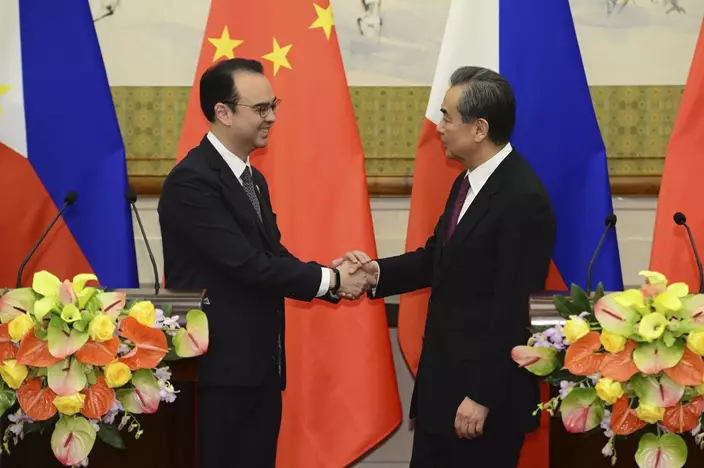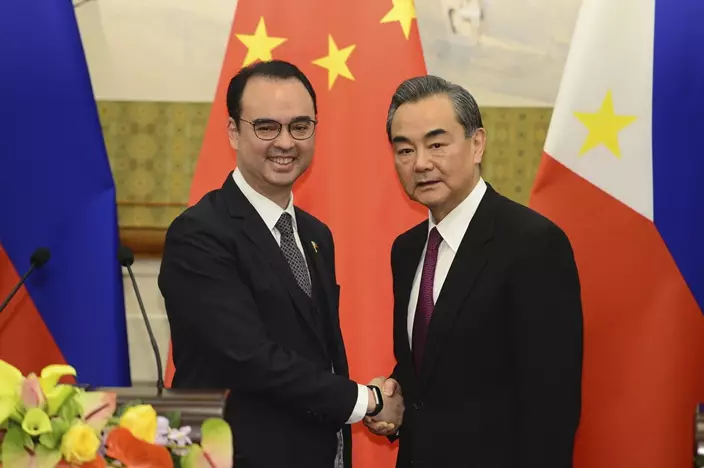Philippine Foreign Secretary Alan Peter Cayetano hailed a "golden period" in ties with China on Wednesday despite differences over the South China Sea as the countries discussed how they might conduct joint development projects in the disputed waters.

Philippine Foreign Affairs Secretary Alan Peter Cayetano, left, shakes hands with Chinese Foreign Minster and State Counselor Wang Yi during a joint press conference on Wednesday March 21, 2018 at the Diaoyutai State Guesthouse in Beijing, China. (Parker Song, Pool via AP).
Cayetano made the remarks in Beijing after meeting with his counterpart Wang Yi, who said the two countries will advance discussions on "offshore oil and gas exploration."
"This way, the South China Sea disputes will no longer block the development of bilateral ties, but rather the South China Sea will be turned into a source of friendship and cooperation between our two countries," Wang said.

Philippine Foreign Affairs Secretary Alan Peter Cayetano, left, shakes hands with Chinese Foreign Minster and State Counselor Wang Yi during a joint press conference on Wednesday March 21, 2018 at the Diaoyutai State Guesthouse in Beijing, China. (Parker Song, Pool via AP).
China and the Philippines have long tussled over islands and reefs in the South China Sea and since taking office in 2013, Xi has taken a hard line on issues of Chinese sovereignty.
Kicking off his second five-year term on Tuesday, Xi declared in a fervently nationalistic address to the ceremonial legislature that China would never cede "one inch" of its territory.

Philippine Foreign Affairs Secretary Alan Peter Cayetano, left, shakes hands with Chinese Foreign Minster Wang Yi before their meeting, Wednesday, March 21, 2018 at the Diaoyutai State Guesthouse in Beijing, China. (Parker Song, Pool Photo via AP)
China rejected an international tribunal's 2016 ruling invalidating much of its claim to virtually the entire South China Sea in a case brought by the Philippines.
But Philippine President Rodrigo Duterte has pushed for closer relations with Beijing, downplaying the dispute over territory claimed by both sides and courting Chinese aid and investment. For its part, China has eased pressure on Philippine fishermen and is working with the 10 members of the Association of Southeast Asian Nations to reach a code of conduct to avoid frictions while operating in the area where an estimated $5 trillion in international trade passes annually.
Cayetano said Duterte will be attending the Boao regional economic forum on China's Hainan island next month, adding that the Philippines looks forward to welcoming Xi for a state visit.
"Our relationship is in a golden period, and with very positive momentum, we are now ready to face more challenges together," Cayetano said. He expressed confidence that China and the Philippines will find "a suitable legal framework" for their different viewpoints on the South China Sea.
Along with rich but diminishing fishing stocks, the South China Sea is believed to hold deposits of oil, gas and other resources.
WASHINGTON (AP) — TikTok is gearing up for a legal fight against a U.S. law that would force the social media platform to break ties with its China-based parent company, a move almost certainly backed by Chinese authorities as the bitter U.S.-China rivalry threatens the future of a wildly popular way for young people in America to connect online.
Beijing has signaled TikTok should fight what it has called a “robbers” act by U.S. lawmakers “to snatch from others all the good things that they have.” Should a legal challenge fail, observers say Chinese authorities are unlikely to allow a sale, a move that could be seen as surrendering to Washington.
Beijing may not want the U.S. action against the popular short-form video platform to set a “bad precedent,” said Alex Capri, senior lecturer at the National University of Singapore and research fellow at Hinrich Foundation. “If Beijing capitulates to the U.S., where does it end?”
In its first official response to the new law, parent company ByteDance delivered a statement Thursday on Toutiao — a Chinese news app it owns — stating it "doesn’t have any plan to sell TikTok.” The Beijing-based firm was responding to media reports that said it was exploring scenarios for selling TikTok’s U.S. business.
The legislation that U.S. President Joe Biden signed this week could allow Washington to widen its scope to target other China-related apps, such as the popular e-commerce platform Temu, and embolden U.S. allies to follow suit, said Hu Xijin, a former editor-in-chief for the party-run newspaper Global Times.
With 170 million American users, TikTok should “have more guts to fight to the very end and refuse to surrender,” Hu, now a political commentator, said Wednesday on Chinese social media.
TikTok vowed to challenge the new U.S. law, which requires ByteDance to divest its stakes within a year to avoid a ban. The company has characterized the law as an infringement on the free speech rights of its users, most of whom use the app for entertainment.
“We believe the facts and the law are clearly on our side, and we will ultimately prevail,” the company wrote on the social platform X.
The fight over TikTok has increased tensions between the U.S. and China, with both vowing to protect their economic and national security interests. U.S. lawmakers are concerned the Chinese ownership of the app could allow Beijing to exert unwanted influence in the U.S., especially on young minds. The law has followed a string of successes by Washington in curbing the influence of Chinese companies through bans, export controls and forced divestitures, drawing protests from Beijing that the U.S. is bent on suppressing China’s rise through economic coercion.
The U.S. has forced other Chinese companies to divest before, including in 2020, when Beijing Kunlun, a Chinese mobile video game company, agreed to sell the gay dating app Grindr after receiving a federal order. But TikTok, created by a Chinese company only for the overseas market and evidence of the nation's tech powers on the global stage, is a high-profile case that Beijing does not want to lose.
National dignity is at stake and could “take precedence over the financial interests of ByteDance investors,” including global investors who own 60% of the company, said Gabriel Wildau, managing director of the New York-headquartered consulting and advisory firm Teneo.
A legal challenge from the company is expected to lean on First Amendment concerns and could drag on for years. Beijing is betting on a legal win, analysts say.
What to do if TikTok doesn't prevail is likely still being debated with the Chinese leadership, said Dominic Chiu, an analyst with Eurasia Group. President Xi Jinping, who will have to sign off on whether to permit or prohibit the sale, probably has not made the final decision, Chiu said.
Luckily for Xi, there is no urgency for Beijing to decide, said Sun Yun, director of the China program at the Washington-based Stimson Center. “A lot of things could change," she said.
If lawmakers get their wish and a sale does occur, it’s likely to be a challenging and messy process for TikTok, which would have to disentangle its U.S. operations from everything else.
For one, the price tag for TikTok’s U.S. business — which is unknown — is expected to be high enough to severely limit the pool of investors and companies who’d be able to afford it. Some investors — including former Treasury Secretary Steve Mnuchin — have already positioned themselves as potential buyers of a U.S. version of TikTok. ByteDance, which is privately held, is valued at $220 billion, according to market tracker Pitchbook.
And there’s uncertainty about what would happen with the TikTok algorithm, the secret sauce that feeds users short videos based on their interests and has contributed to the platform’s status as a cultural juggernaut.
ByteDance would be barred from controlling the algorithm of a U.S. spinoff of TikTok. Many experts believe Chinese authorities would block any sale of the technology that populates people's TikTok feeds under export regulations revised in 2020, when then-President Donald Trump unsuccessfully tried to ban TikTok through an executive order that was blocked in federal courts.
Some, including Mnuchin, have said TikTok would need to be rebuilt in the U.S. using new technology. But it's unclear what that might look like, or how well it can reproduce the type of video recommendations users have grown accustomed to seeing.
Robin Burke, a professor of information science at the University of Colorado Boulder, says some aspects of the algorithm might be replicated by industry insiders. But he also noted there are areas where TikTok appears ahead of its competitors and duplication might prove challenging.
“TikTok has all the experience, they have all the data,” Burke said. “I think it’s unlikely that a U.S. business — if they don’t inherit the technology from the parent company — would be able to build something equivalent. Certainly not right away.”
AP journalist Dake Kang contributed from Beijing.

FILE - A TikTok content creator, sits outside the U.S. Capitol, April 23, 2024, in Washington. TikTok is gearing up for a legal fight against a U.S. law that would force the social media platform to break ties with its China-based parent company or face a ban. A battle in the courts will almost certainly be backed by Chinese authorities as the bitter U.S.-China rivalry threatens the future of a wildly popular way for young Americans to connect online. (AP Photo/Mariam Zuhaib, file)

FILE - The TikTok logo is displayed on a mobile phone in front of a computer screen, Oct. 14, 2022, in Boston. TikTok is gearing up for a legal fight against a U.S. law that would force the social media platform to break ties with its China-based parent company or face a ban. A battle in the courts will almost certainly be backed by Chinese authorities as the bitter U.S.-China rivalry threatens the future of a wildly popular way for young Americans to connect online. (AP Photo/Michael Dwyer, File)














